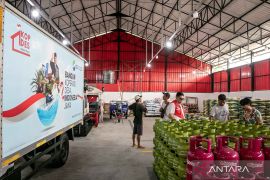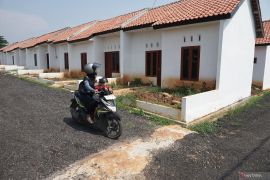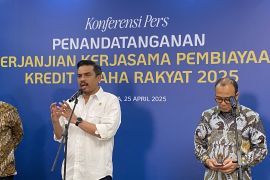Moreover, the amount of credits that had been extended until November 17 by distributor banks -- Bank BRI, Bank Mandiri, and Bank BNI -- only reached Rp11.7 trillion, or less than half of the governments target to extend KUR worth Rp30 trillion this year.
"The distributor banks are making various efforts to expedite the realization of KUR to small businesses," Braman Setyo, the deputy for business restructuring and development of the Ministry of Cooperatives and SMEs, stated here on Thursday (Nov. 19).
He noted that the distribution of KUR credits until November 17, through Banks BRI, Bank Mandiri, and Bank BNI, had only reached Rp11.7 trillion. Therefore, the three executing banks are doing their best to expedite the provision of KUR, so that the amount disbursed this year could reach over Rp20 trillion.
Bank BRI, for instance, is assigning four KUR marketing officials at each of its outlets and is conducting a promotional event every Saturday and Sunday. Bank BNI has increased the number of its outlets for the distribution of KUR and has established cooperation with Bank BPR (smallholders credit bank). Bank BNI is also launching a program called "BNI Greets the Market."
In the meantime, Bank Mandiri is stepping up efforts to introduce the KUR credit scheme among small businesses and people through the distribution of leaflets and banners.
According to Braman, the banks continue to carry out promotional activities.
"With such a strategy and commitment of the executing banks, the KUR credit disbursement could reach over Rp20 trillion," he affirmed.
He has even forecast that the distribution of KUR could reach Rp24 trillion.
Bank Mandiri, the countrys largest lender, said this year it had disbursed Rp600 billion in KUR. Bank Mandiris micro and banking business officer said the program is aimed at promoting the role of the bank to encourage development of small and medium enterprises.
He said that Bank Mandiri has disbursed Rp18.6 trillion in small business credit (KUR) since 2010 with non performing loan (NPL) of 1.2 percent.
"We started offering KUR in 2010 and by the end of 2014 we already disbursed Rp18.6 trillion with NPL of only 1.2 percent," Tardi said on Thursday (Oct 22 ).
He said as from August in 2015, the bank has also launched a program for productive KUR to allow household mothers in rural areas having productive enterprises access to bank credit.
"Yes, the credit program is offered mainly to wives of school teachers in rural areas having productive business. They could get credit if they need additional capital," Tardi said.
The bank hopes to disburse up to Rp3.2 trillion until the whole of this year. "Yes, we are optimistic that the target would be reached by the end of this year," Tardi said.
In the meantime, the government in its efforts to expedite the distribution of KUR credit and boost the development of small businesses in the country has cut the interest rate of KUR loans this year from 22 percent to 12 percent.
"In order to widen banking access for entrepreneurs through the KUR scheme, the government has lowered the interest rate for KUR loans from about 22 percent to 12 percent," Presidential Communication Team leader Ari Dwipayana said on Wednesday (Oct 7).
President Joko Widodo had earlier asked for a number of breakthroughs so that small scale businesses could get easy access to KUR credits for their capital.
The breakthrough, according to Ari, is an important step because the government is determined to protect and reinforce small and medium-sized businesses.
"Data, which I have obtained on KUR, shows that the KUR credit distribution is still low," President Widodo said while opening a cabinet limited meeting on KUR on Monday night (Oc7 5).
The President said the government should strengthen the capital for small businesses because it is one of the forms of protection they should receive.
"They must be protected and reinforced so that they are able to develop a competitive edge," the President stated.
The President also explained that in 2015, the amount of KUR credits made available had totaled Rp30 trillion, with the interest rate lowered from 22 percent to 12 percent.
"We expect that the interest rate for KUR loans will go down further next year to 9 percent," the Head of State said, hoping that the budget for KUR credits that has been set should be distributed to by the end of the year so that the wheel of the national economy keeps turning.
Regarding the interest rate of the KUR loans which will be cut further to nine percent next year, the government has set a target to enhance the credit to about Rp100 trillion-Rp120 trillion.
Deputy for Business Development and Restructuring of the Ministry of Cooperatives and Small and Medium Enterprises, Braman Setyo, said on Thursday that the government is increasing the volume of its KUR distribution target in an effort to encourage businesses under the KUR program.
"The government has set aside a fund from the state budget as interest subsidy, amounting to Rp10.5 trillion, and guarantee service fee (IJP) worth Rp2.1 trillion ," Setyo said.
The Ministry of Cooperatives and Small Scale Enterprises has been utilizing and cooperating with the Business Development Services in 27 provinces to provide assistance to small and medium size businesses (UMKM) find access to the KUR program at banks.
"A total of 42 Integrated Business Service Centers have been set up and manned by 252 personnel ready to make the KUR program a success," he said.(*)
Reporter: Andi Abdussalam
Editor: Heru Purwanto
Copyright © ANTARA 2015











